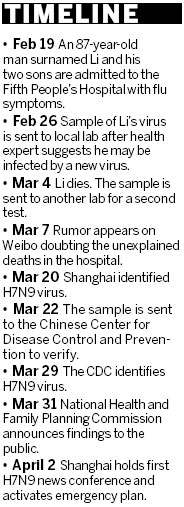Authorities deny delay in H7N9 reports
Updated: 2013-04-11 07:58
By Wang Hongyi and Wu Ni in Shanghai (China Daily)
|
||||||||

A senior health official in Shanghai on Wednesday denied media reports that the city might have delayed reporting the outbreak of the previously lesser-known H7N9 bird flu to the national health authorities.
"We finally confirmed the deadly virus on March 20 and soon sent the virus sample to the national disease control department," Lu Hongzhou, deputy director of the Shanghai Public Health Clinical Center and a leading public health expert in the city, told China Daily.
The Southern Metropolis Daily reported on Wednesday that the Shanghai health department confirmed the H7N9 virus on March 10 but reported the virus to the national health department 12 days later, triggering public speculation that Shanghai had deliberately delayed reporting the case.
"During the few days prior to March 20, we collected information, medical records and tested samples. It was on March 20 that we determined the virus to be H7N9, a bird flu virus that had never been found to affect humans before," Lu said.
By 5pm on Wednesday, the H7N9 virus had infected 33 people and killed nine of them, according to the National Health and Family Planning Commission. All the infections were detected in the eastern provinces of Jiangsu, Zhejiang and Anhui, and Shanghai.
Lu said public health professionals had no idea of the new virus before it was found, so it was reasonable to spend some time confirming it.
On February 19 three patients were admitted to the Shanghai No 5 People's Hospital.
Tests by the city's heath departments ruled out the possibilities of seasonal flu, H1N1 flu, H5N1 flu and SARS in the three deaths. Lu from Shanghai Public Health Clinical Center then suggested it was possible the patients were infected with a new virus as the H1N1 virus experiences continuous recombination and variation.
Shanghai health authorities finally confirmed the virus as H7N9 on March 20 and sent it to the national health department for further tests, in keeping with protocol, Lu said.
On March 29, the China Center for Disease Control and Prevention found the H7N9 virus in samples sent from Shanghai, and two days later it was announced that H7N9 bird flu was found in humans for the first time.
"Identifying and judging a new virus should be a cautious process, which needs time," said Liu Ye, a lawyer from the Shanghai Haishang Law Firm who has a strong medical and virology background.
Contact the writers at wanghongyi@chinadaily.com.cn and wuni@chinadaily.com.cn
(China Daily 04/11/2013 page5)

 In Photos: 7.0-magnitude quake hits Sichuan
In Photos: 7.0-magnitude quake hits Sichuan
 Li Na on Time cover, makes influential 100 list
Li Na on Time cover, makes influential 100 list
 FBI releases photos of 2 Boston bombings suspects
FBI releases photos of 2 Boston bombings suspects
 World's wackiest hairstyles
World's wackiest hairstyles
 Sandstorms strike Northwest China
Sandstorms strike Northwest China
 Never-seen photos of Madonna on display
Never-seen photos of Madonna on display
 H7N9 outbreak linked to waterfowl migration
H7N9 outbreak linked to waterfowl migration
 Dozens feared dead in Texas plant blast
Dozens feared dead in Texas plant blast
Most Viewed
Editor's Picks

|

|

|

|

|

|
Today's Top News
Live report: 7.0-magnitude quake hits Sichuan, heavy casualties feared
Boston suspect cornered on boat
Cross-talk artist helps to spread the word
'Green' awareness levels drop in Beijing
Palace Museum spruces up
First couple on Time's list of most influential
H7N9 flu transmission studied
Trading channels 'need to broaden'
US Weekly

|

|







